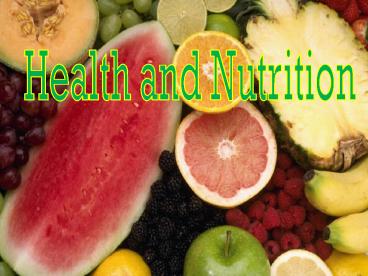Health and Nutrition - PowerPoint PPT Presentation
Title:
Health and Nutrition
Description:
Nutrition: Why should you care ? Happiness is nothing more than good health and a bad memory. Albert Schweitzer Physical Growth Body image Brain Daily ... – PowerPoint PPT presentation
Number of Views:6069
Avg rating:3.0/5.0
Title: Health and Nutrition
1
Health and Nutrition
2
Why should you care ?
Nutrition
Happiness is nothing more than good health
and a bad memory. Albert Schweitzer
- Physical Growth
- Body image
- Brain
- Daily activities
- Sports performance
- Prevention of diseases
3
(No Transcript)
4
(No Transcript)
5
The Importance of Good Nutrition
Good nutrition enhances your quality of life and
helps you prevent disease. It provides you with
the calories and nutrients your body needs for
maximum energy and wellness. NUTRITION THE
PROCESS BY WHICH THE BODY TAKES IN AND USES
FOOD. NUTRIENTS SUBSTANCES IN FOODS THAT YOUR
BODY NEEDS TO GROW, TO REPAIR, AND TO PROVIDE
ENERGY. CALORIES UNITS OF HEAT THAT MEASURE THE
ENERGY USED BY THE BODY AND ENERGY SUPPLIED TO
THE BODY BY FOODS.
6
What Influences Your Food Choices?
- 1. Hunger and Appetite
- Hunger Natural need to eat and not starve.
- Appetite A desire to eat.
- 2. Emotions
- Stress, Anger, Happy, Sad, Boredom, etc,
- 3. Environment
- Family and Friends
- 4. Cultural and Ethnic Background
- Race, Religion, Heritage
- 5. Convenience and Cost
- Where you live, On the go lifestyle, Family
income - 6. Advertising
- Health messages, Influence your looks
7
Nutrients
- 6 GROUPS OF NUTRIENTS
- Carbohydrates
- Proteins
- Fats
- Vitamins
- Minerals
- Water
8
Carbohydrates
- Simple carbohydrates are sugars. Examples
include - glucose
- fructose
- lactose.
- Carbohydrates are the starches and sugars
present in food. - They are classified as either simple or complex.
- Complex carbohydrates are starches. Examples
include - whole grains
- seeds
- legumes
- - Fiber is an indigestible complex
carbohydrate that helps move waste through the
digestive system.
- Bodys preferred source of energy.
- Body converts all carbohydrates to glucose, a
simple sugar. - Glucose is not used right away and it is stored
as glycogen. - Too many carbohydrates will cause the body to
store the excess as fat.
9
Proteins
Proteins are nutrients that help build and
maintain body cells and tissues.
- Proteins are classified into two groups
complete and incomplete. - Complete proteins contain amounts of all nine
essential amino acids. - SOURCES INCLUDE
- Fish, meat, poultry, eggs, milk, cheese,
yogurt, and many soybean products. - Incomplete proteins lack one or more essential
amino acids. - SOURCES INCLUDE
- Beans, peas, nuts, and whole grains.
- Proteins have many functions
- - Help make new cells.
- -Help make and repair tissues.
- - Help make enzymes, hormones, and
antibodies. - - Provide energy.
10
Fats
- Fats are a type of lipid, a fatty substance that
do not dissolve in water. - The building blocks of fats are called fatty
acids - Fatty Acids are classified as two types
- Saturated
- Animal fats and tropical oils
- High intake is associated with an increased risk
of heart disease - Unsaturated
- Vegetable fats
- Associated with a reduced risk of heart disease
- Fatty acids that the body needs, but is unable to
make are called essential fatty acids - Transport vitamins A, D, E, and K
- Sources of linoleic acid- essential fatty acid
that is needed for growth and healthy skin - High intake of saturated fats is linked to
increased cholesterol production - Excess cholesterol can lead to an increased risk
of heart disease
11
Vitamins and Minerals
- Vitamins are compounds that help regulate many
vital body processes that include - Digestion 2. Absorption 3. Metabolism
4. Circulation - Vitamins are classified into two groups
- Fat-soluble vitamins are absorbed, stored, and
transported in fat. Your body stores these
vitamins in your fatty tissue, liver, and
kidneys. Excess buildup can be toxic.These
include vitamins A, D, E, and K.
- Water-soluble vitamins dissolve in water and pass
easily into the blood during digestion. The body
does not store these so they need to be
replenished regularly. Includes vitamins C, B1
,B2, Niacin, B6, Folic acid, and B12.
Minerals are substances that the body cannot
manufacture but are needed for forming healthy
bones and teeth and regulating many vital body
processes. Important minerals include
-Calcium -Phosphorus Magnesium -Iron
12
Water
- Water helps to maintain many bodily functions.
- Lubricates your joints and mucous membranes.
- - Enables you to swallow and digest foods.
- Absorb other nutrients, and eliminate wastes.
- - Perspiration helps maintain normal body
temperature. - Water makes up around 65 of the body.
- Its important to drink at least 8 cups of water
a day to maintain health.
13
The Food Guide Pyramid
Are You Eating A Balanced Diet?
14
Nutrition and Product Labeling
Product labeling advertise a foods nutritious
value. Some common used terms are light, less,
free, more, rich, rich in, lean, or excellent
source of. Many food products have open dates on
their label. Examples are expiration date,
freshness date, pack date, and sell-by date.
5-4 Food and Healthy
Living

